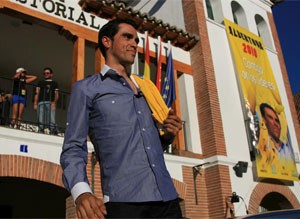Spaniard takes important step to boost his credibility
 Triple Tour de France winner Alberto Contador has insisted that he is not guilty of doping, and has said that he is willing to have his past samples retested at any point to prove this is the case.
Triple Tour de France winner Alberto Contador has insisted that he is not guilty of doping, and has said that he is willing to have his past samples retested at any point to prove this is the case.
The Spaniard has come out fighting today, responding to the questions and suggestions being posed after his positive test for traces of Clenbuterol. He gave what will be interpreted by his supporters as a reassuring response, saying that he had nothing to hide, including blood doping.
“If they want to test every sample I’ve given in the Tour, [in] as many different laboratories as they want, or if they want to freeze it for three or five years until other future tests are scientifically validated and then check it, they can do it. I have nothing to hide,” he told Reuters.
Contador returned to the headlines on Wednesday when his spokesman issued a statement saying that the rider had been notified that urine samples taken on the rest day of the Tour de France and the following day were both positive for traces of Clenbuterol. The amount in question was 50 trillionths of a gram, 40 times less than what anti-doping laboratories accredited by WADA must be capable of detecting.
The samples were tested in the Cologne laboratory, which has equipment which is particularly sensitive to substances like Clenbuterol. It has been stated that the levels concerned would not have been detected in many other laboratories.
However, despite the small dose, WADA director general David Howman has said that there is no allowable level under the WADA Code.
“The issue is the lab has detected this. They have the responsibility for pursuing [it],” he told the Associated Press. “There is no such thing as a limit where you don’t have to prosecute cases. This is not a substance that has a threshold.”
Contador’s response is a simple one: he said that the levels were so small in his sample that it highlights that the current rules need to be changed.
“There has to be a limit set for substances like Clenbuterol so that quantities as tiny as those found in my body due to contaminated food do not count as a positive.”
“There should be [limits]… the norms have to evolve, just as they have done for other substances like caffeine, where they changed the regulations because they realized they weren’t right.
“In the case of Clenbuterol, positives should be positives because of the quantity found, with a specific limit, not because of the substance itself. It just can’t be that positives for contaminated food stuff like mine are placed in the same category as a standard positive for doping,” he said.
“What I want is for all of these doubts and suspicions, even the slightest ones, to be cleared up completely and permanently,” he added.
Spokesman rejects suggestions of blood doping:
As reported yesterday on VeloNation, the German ARD journalist Hans Joachim Seppelt claimed that Contador’s samples from the period in question contain high levels of plasticizers, a substance found in blood bags. His suggestion is that Contador may have had a blood transfusion around the tine of the positive test, reinfusing blood which contained traces of Clenbuterol.
L’Equipe echoed that suggestion today, stating that the laboratory in Barcelona had found these signs.
Contador’s spokesman, Jacinto Vidarte, told AP today that the Spanish rider “categorically denies having a blood transfusion. There is nothing to that. It is a science fiction story.”
He also claimed that the World Anti-Doping Agency has not validated a method for detecting plastic from blood transfusion bags. This was contradicted by Howman, who said that a method was “fully validated and has been used in the food industry for years.”
“Its use for anti-doping purposes is partially validated and evidence from it, among others, can be used before tribunals.”
The outcome is difficult to predict at this point, but what’s certain is that this story will rumble on for weeks, months or possibly longer. The UCI is looking into the Clenbuterol case and said that it is going to take its time and be thorough. WADA told VeloNation yesterday that it was working with cycling’s governing body on the matter.
“WADA can confirm that, upon request from the UCI, it is providing scientific support to the UCI to analyze the elements that are relevant to the case,” said a spokesperson.
Contador’s response today is important in lessening some of the doubts. Offering testing agencies the chance to screen all his samples is a wise move, and so too saying that he will allow the samples to be frozen until more sophisticated tests are developed.